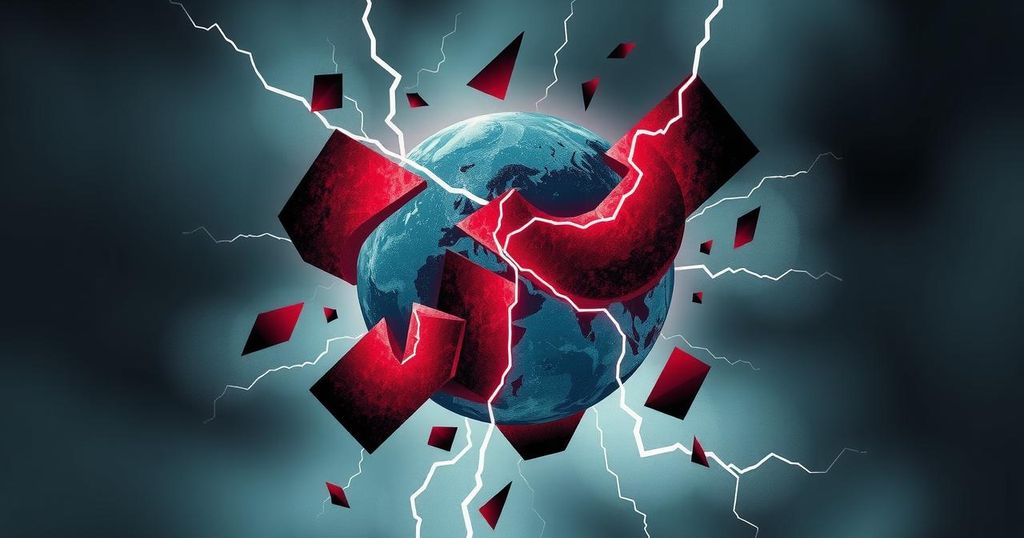Sudan at a Geopolitical Crossroads: Challenges and Global Implications

Sudan faces profound geopolitical challenges, driven by ethnic divisions and a humanitarian crisis resulting from ongoing conflicts. The country’s natural resources draw regional and international interest, while its strategic location carries implications for broader instability across Sub-Saharan Africa. A comprehensive international response is essential to prevent further deterioration and to address the root causes of the crisis, which affect the region significantly.
Sub-Saharan Africa, particularly Sudan, is undergoing notable geopolitical changes driven by longstanding internal rivalries since independence in 1956. The country’s strategic location along the Red Sea, coupled with rich natural resources like oil and minerals, makes it a focal point for various regional and international interests. However, these factors also lead to increased geopolitical tensions and potential for widespread conflict.
Sudan’s ethnic diversity, marked by a mix of Arab, black African, and Christian populations, generates complex challenges. The country has experienced continuous conflict post-independence, failing to establish a stable democratic framework. Current crises, including those in Darfur and Kordofan, form a volatile environment that risks further destabilization.
The precarious religious and ethnic divisions in Sudan threaten to escalate into a civil war, mirroring situations in other conflict-ridden regions. Internally, the state’s weaknesses create the possibility of Sudan emerging as a failed state, with repercussions that could destabilize both regional and global peace initiatives.
The scale of the humanitarian crisis is staggering, with over 10 million displaced people and over 25 million in urgent need of assistance. Vulnerable neighboring states, such as Chad, might face further instability from this conflict, which has historical context tied to the Darfur region’s involvement with Chadian opposition forces.
The gold rush in the Sahel and Sahara regions exacerbates ethnic tensions, with artisanal exploitation fueling intercommunal conflicts. With Sudan as one of Africa’s largest gold producers, illicit activities connected to this sector could intensify conflicts, particularly in regions like Darfur while local armed groups and militias attempt to navigate the existing turmoil.
The military leader Mohamed Hamdane Dogolo has leveraged coalitions with ethnic groups, bolstering a powerful paramilitary network that threatens to further complicate the conflict. Historical ties, particularly among tribes in Chad linked to Sudan’s internal strife, indicate that regional dynamics are likely to strengthen existing conflicts rather than resolve them.
The simplification of the ongoing conflict in Sudan as merely a power struggle overlooks its deeper roots in social injustices and long-standing rebellions. The military has been a flashpoint for ideological and political rivalries, suggesting that the current situation is part of a larger continuum of conflict.
The international community’s engagement is critical to avert a deeper crisis. Failure to address the situation could lead to similar outcomes to those seen in Afghanistan, with rising terrorism, organized crime, and widespread displacement. External support and intervention remain key to fostering stability in the region as Sudan continues to influence neighboring countries profoundly.
Sudan’s critical geopolitical position acts as a gateway between North and Sub-Saharan Africa, with implications for U.S. economic and security interests. The nation’s rich resources and strategic involvement in regional diplomacy underscore its importance. Therefore, the current unrest presents both a risk and an opportunity for global alliances in the face of shifting power dynamics in the region.
Sudan’s geopolitical significance has emerged from its location and natural resources, but its internal political strife has hindered development. The country’s ethnic diversity and historical conflicts have contributed to a cycle of violence, which remains unresolved since its independence. As Sudan faces escalating crises, the wider regional implications of its instability draw attention from neighboring countries and global actors alike, emphasizing the need for comprehensive solutions.
The situation in Sudan is critical for both regional stability and international security. With the potential for escalating violence and humanitarian crisis, proactive international engagement is necessary. Addressing the root causes of conflict and fostering dialogue among stakeholders could provide a pathway toward peace, where Sudan’s influence on neighboring states could stabilize rather than destabilize the region.
Original Source: moderndiplomacy.eu








